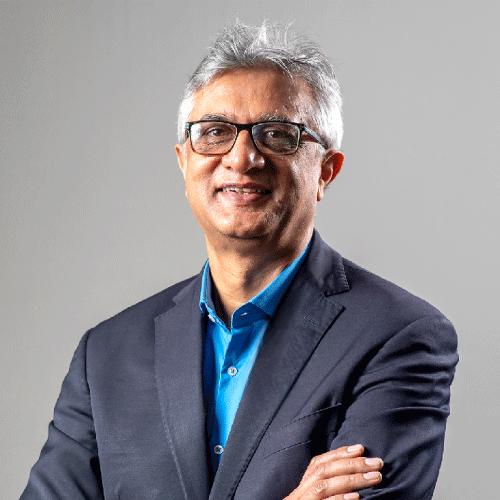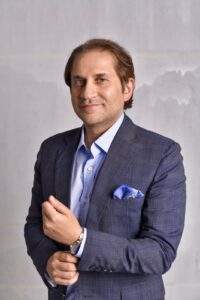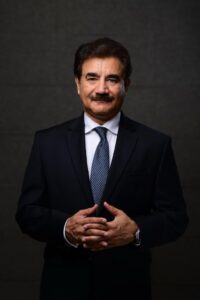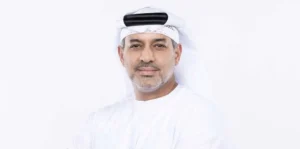
Longtrepreneur continues to bring the best-in-class tech and business leaders to get their take on long-term thinking in the world of Commerce, Corporate Communications, Healthcare, Technology and Entrepreneurship.
This week’s “Take the L” series guest is a personality who needs no introduction: Dr. Faisal Sultan (Chief Executive Officer at Shaukat Khanum Memorial Cancer Hospital & Research Centre).
Here is the conversation in an interview format between Yawar Abbas (Longtrepreneur) and Dr. Faisal Sultan (Chief Executive Officer – Shaukat Khanum Memorial Cancer Hospital & Research Centre).
Yawar Abbas: What led you to join the Shaukat Khanum Hospital at the organization’s helm?
Dr. Faisal Sultan: This was a series of events which had nothing to do with me directly. Two years prior to becoming chief executive officer, I was appointed the medical director and in August 2002 my predecessor resigned and left the organization. I took on the role in an acting capacity. There was a search for a replacement from overseas, which was unsuccessful. After some time the board and the chairman asked me to take on the responsibility full-time and thus this is how I came to be where I am.
Yawar Abbas: How have you seen your role evolve at Shaukat Khanum since you took charge?
Dr. Faisal Sultan: Over the last 22 years, my role has indeed evolved significantly. When I was charged with the responsibility, the first major change that I saw was that of the responsibility of fundraising and marketing being transferred over to the hospital leadership from the Chairman and the board. This was at least in part due to the fact that the chairman who had assumed the fundraising responsibility from the inception of the hospital until around the early 2000s was now engaged extensively in his political career, and therefore it was felt that it was not reasonable to expect him to do active fundraising, and that this role ought to be taken over within the institution.
Other things that have changed and evolved over time include the span of responsibilities; we started out as a single campus institution, but with time evolved into two fully functional hospitals while a third one is being built at the present time. Other things that have happened include the expansion of our laboratory collection network as well as walk-in clinics and diagnostic centers. We have embarked on a number of quality initiatives, as well as built our own hospital information system to serve the needs of the institution for information flow, electronic health records, and so on.
Yawar Abbas: What is your 10-year vision for Shaukat Khanum?
Dr. Faisal Sultan: Within the next 10 years, the institution needs to complete its campus in Karachi while continuing high-quality services and maintaining standards at Lahore and Peshawar. Institutionalization of fundraising within the organization as well as self-reliance on being able to do this without the intervention of the Chairman are also important strategic imperatives.
Training and retaining high-quality manpower, as well as continuing to meet international quality, accreditation, and standards will remain our objectives. Additional campuses or evolution of the hub and spoke model to increase. The reach of our Oncology services would also be required.
Investment into new technologies, including opportunities arising out of computing and newer modes of treatment specially those coming out of molecular biology and targeted therapies will be important to acquire and master. I would also like to make sure that the institution grows and indeed takes the next step up in contributing to global knowledge through research in cancer and allied specialties.
Yawar Abbas: How does Shaukat Khanum uphold its mission amid economic challenges, and why is public support more crucial than ever?
Dr. Faisal Sultan: Upholding the mission is crucial for us, and therefore, despite economic challenges, we continue to highlight the work that we do to ensure that our core donor and supporter is aware of what we do so that we remain top of mind for them. And that is exactly why public support is more crucial than ever because our donor wishes to see us remaining true to our mission where we provide consistent high-quality oncology care to our patients irrespective of their ability to pay as well as our investment into upgrading and maintaining our human resources, as well as investment into innovation and research.
Yawar Abbas: What role does donor support play in ensuring free cancer treatment for those in need?
Dr. Faisal Sultan: Donor support is crucial in making sure that we can provide high-quality free cancer care to those that cannot pay for it themselves. Cancer care is expensive, but it’s very nature because it is multi specialty and often deploys the latest in Medicine.
Were it not for support over the years which is consistent and growing we would not be able to deliver this care to those that require it the most. Cancer care is hard enough as it is and nearly impossible to deal with if the resources are not available to most of the poor segments of society.
Yawar Abbas: What progress has been made on the Karachi hospital, and what challenges remain?
Dr. Faisal Sultan: The physical structure of the Karachi hospital is under construction, and the grey structure is completed. At present finishing work are going on and the Prime challenges are to make sure that we have enough resources and money to be able to finish this to the point of where it can be inaugurated and clinical services started. Construction prices have shot up in recent years and inflation. In addition to Changez in the exchange rate of the Pakistani rupee in the international market have been important challenges.
Yawar Abbas: Has Shaukat Khanum considered partnering with biotech companies to make cancer therapy leaps?
Dr. Faisal Sultan: Yes, we do partner with suitable organizations, whether academic, or otherwise to jointly work towards newer cancer modalities, whether diagnostic or therapeutic.
Yawar Abbas: Does Shaukat Khanum partner with international cancer hospitals to conduct joint research and development?
Dr. Faisal Sultan: Yes, we do have collaborations with academic organizations outside of the hospital, but these often depend on specific research topics and mutual interests.
Yawar Abbas: How much of a budget does Shaukat Khanum need in the two years to meet its yearly goals and invest in R&D?
Dr. Faisal Sultan: We devote about 5% of our operational budget on research.
Yawar Abbas: Please share a serendipitous time when Shaukat Khanum Hospital met its immediate financial need.
Dr. Faisal Sultan: There have been many such occasions and various challenges across the entire history of the hospital have been encountered and met through such lucky and serendipitous events.The financial challenges of 1997 and the public support to ensure continuation of the hospital is one example. Another is the donations that came through for our research facility and for bone marrow transplant.
For the first of these, the plan for the facility had been ready and we were looking for funds just at the time that a very generous donor agreed to help set up the first research laboratory in the hospital. The second of these came about as a result of a personal medical challenge of a family that had benefited from a bone marrow transplant from overseas, but felt that this was something that they must support within Pakistan to ensure that those that could not travel outside for logistic or monetary reasons were not denied this type of cancer care.
Yawar Abbas: How do you plan to broaden Shaukat Khanum’s reach to mainstream demographics in Canada?
Dr. Faisal Sultan: We are committed to expanding our reach in Canada through the Cancer Education and Research Foundation (CERF), an entity registered with the Canada Revenue Agency. While much of our support comes from the Pakistani diaspora, we recognize the importance of making CERF’s mission relevant to the broader Canadian community.
To achieve this, we hope to engage mainstream audiences by fostering collaborative research and innovation in partnership with Canadian organizations and academic institutions. By highlighting the need to support equitable access to quality treatment, we hope to be able to have a higher global impact on the lives of cancer patients.
Yawar Abbas: On a lighter note? Which one hobby do you have to let yourself relax after your hectic schedule?
Dr. Faisal Sultan: Generally, I am able to find time for myself to keep myself active and busy and fit as well as to be able to read a range of literature.
Yawar Abbas: In an apolitical manner, what is your relationship with Mr. Imran Khan(the founder) of Shaukat Khanum Cancer Hospital?
Dr. Faisal Sultan: I first got to know Mr. Khan when he was visiting the United States to evaluate what all was required for building a hospital of this nature. This was in 1989 and I was a new trainee in Internal Medicine in Connecticut. That was a coincidental and one time meeting.
Once I joined the hospital in 1995 I got to see him and meet him and see his passion and commitment for this mission firsthand. Once I became the chief executive officer this relationship was further strengthened, and I was able to see many of his deep beliefs and convictions, and also was very solidly supported by the board and by the chairman in enabling me to fulfill my role for the hospital.




